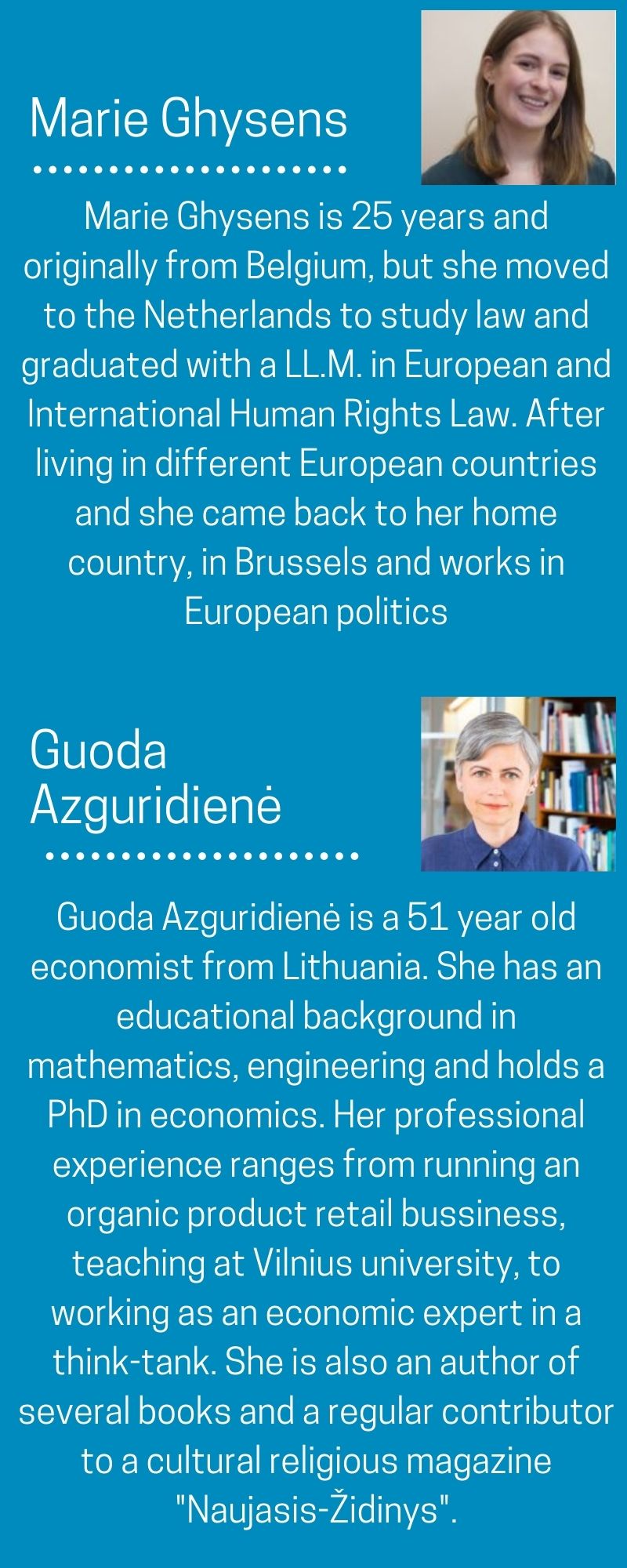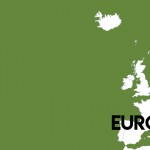For the 50th edition of E&M and, therefore, the 50th edition of BRAIN, we wanted to see how work and our expectations of it have changed (or maybe they haven’t!?) over the past years. We talked to Guoda (51) from Lithuania and Marie (25) from Belgium to hear what younger and older Europeans think about this.
How would you describe your current work situation?
Marie: Good but unstable. Good because the position I am currently holding fulfils almost all the criteria of what I would call ‘my dream job’. Unstable because this is a short-term replacement contract.
Guoda: I am working as a high-level expert for an NGO 4 days a week.
 Are you happy?
Are you happy?
Marie: Yes, I am happy. Professionally speaking, these last few months have been really challenging but enriching at the same time. I have been learning everyday, in terms of the content but also in regards to ‘communication’ with colleagues. Indeed, the teleworking situation has obliged us all to re-think the way we communicate with each other. But even though we are lucky to live in a time where we have so many different means to connect and to communicate at our disposal, nothing will ever be as efficient as a face-to-face communication.
This was for the positive part.
Now, the instability of my situation, as described above, is always kind of ticking in my head and in some way triggers stress – how much depends on the day.
Guoda: Yes.
How do you imagine your perfect work?
Marie: First of all, the format of the perfect job for me will be a combination of teleworking two days a week and working in the office, to see and maintain a relation with colleagues.
Regarding the content of the work itself, it would have to do with giving policy advice and advocacy around the rights of children in the judicial system. This would be combined with a ‘in the field’ part’ where I would meet children that are somehow involved in the judicial system either directly, because they have breached the law, or indirectly, because their parents have been incarcerated.
Guoda: Similar to my current job, with some corrections. Or self-employed.
Do you think the nature of work has changed significantly in the past years?
Marie: I wouldn’t say that the nature of the work has changed but the format definitely has. Before, people usually started working straight after they finished university, found a job in their hometown, and stayed in the same position for their whole career.
Nowadays, we have so much more opportunities, also geographically. We have the possibility to travel, learn new languages, also during our studies, which then obviously allows people to enter different job markets almost all around the world.
Guoda: Yes, more people seek to work as freelancers or with flexible job contracts. This trend would advance even more if the legal framework allowed for it.
Have these changes affected you personally and how?
Marie: They have impacted me considerably. Ever since I finished high school, I have done things my parents would have never done and had no possibility of doing. For example, I went abroad for a year, participating in a European project. Then, I went to a European University, in a foreign country where classes were taught in a foreign language.
This has changed my professional life but also very much my personal life: There are some days or even some weeks where I speak more in English than in my mother language; most of the people I am with on an everyday basis come from all around Europe; my partner lives in another country, which has allowed me to discover another culture, country and language.
Guoda: Yes. I had my own business for a decade, and when I returned to the job market, I chose the option with more freedom and less responsibility but also lower pay.
It is often said that expectations towards work differ between the younger and the older generation. Would you agree?
Marie: I would say that, for older generations, what would qualify as a good job is a job that gives you security in the long term, whereas, for the younger generations, the personal fulfillment prevails.
Guoda: There are two aspects. There have always been differences between younger and older people, with the former voting for changes, speed and possibilities to explore new fields, to meet new challenges and the latter focusing on loyalty, values, stability and depth.
The other aspect is the historical period we’re living in. How does this older generation (like mine) differ from this younger generation? There are many differences and it is not easy to say they’re due to one’s generation and not to the particular person, because people also differ within generations. I‘d say that our generation, which started their career right after the collapse of the Soviet Union along with the emerging market economy and democracy, cherished freedom to choose a job and to earn money by our own efforts very much. While today, this freedom is taken for granted and often abused. Just a reminder: in Soviet times graduates “received” job placements and did not choose them. Most likely, that meant staying in that job for their whole life.
How do you see these changes in the context of the expansion of the EU’s freedom of movement?
Marie: Freedom of movement means that the job market has expended significantly as almost every single job seeker is entitled to work anywhere in Europe. This has opened the gates for more opportunities but also more competition. Nowadays, we do know that if our dream job cannot be found in our hometown, we can still look for it in almost any other country of the EU.
Guoda: I see it very positively. EU’s freedom of movement gives people more possibilities to do what they like. This is especially useful if you live in a small country such as Lithuania. So, if one values this freedom and focuses on his or her goal, there’s a lot to achieve.
Would you say that you are optimistic about the role of work in the future?
Marie: I would have a more balanced answer here. On the one hand, work is taking less and less importance in our life and hobbies are taking a bigger place. In some countries, liek France, fulltime hours have even been reduced. So, in that sense, our professional life is cedeing space and time to our personal life.
But on the other hand, we also need more money to be happy, we have higher standard of living, we live in a super consumer society, and to fill out the extra time granted to us thanks to the reduction of working hours, paid holidays, and so on.
Needing more money means having to work more. We would feel unfortunate and poor if we could not afford a week of holidays abroad per year, if we could not buy a car, have Internet access, have the latest technology toy… things that the older generation did not consider as essential to live a happy life. Or, rather, that the consumerist society did not dictate as being essential to be happy. So, in that sense, work has taken and will continue to take a bigger role as we will always need more money.
Guoda: If I look at peoples‘ attitudes to be more self-reliant and economically active, I‘m optimistic. Also, if I look at economic and technology trends that facilitate this variety and flexibility of work forms and relations, I’m optimistic, too. However, I am very much pessimistic regarding labour legislation. They contradict this progress towards flexibility and self-accountability with so-called welfare state standards and Nany state principles. They aim for security, stability and equality. There is no creation, just copy-paste and consumption; while human nature is moving, changing and always different.
What advice would you give to the younger generation? Or, what advice do you usually get from the older generation?
Marie: People from the older generation usually do not really understand what I studied and why I decided to study such an abstract topic. They also often tell me to find a job that satisfies me. This is good advice in the sense that they do know what it is to work in the same place for many years and how important it is to have a job that makes you happy.
Guoda: For younger generations, I‘d advise them to remember how precious freedom of choice is, to choose what you do in life, where you live and so on. This is not a given – look at Belarus. All the other things that look like obstacles, for example the need to work, to put yourself through university, can be overcome.
When I was young, I got the best advice from my parents which I’ve followed ever since: be economically self-sufficient as much as possible but don‘t take financial well-being as the most important goal in life.
We thank Marie and Guoda for their time. Answers may have been edited for bevity and clarity.










